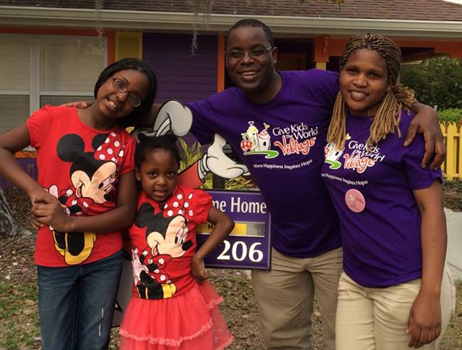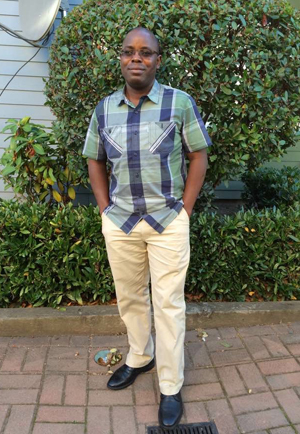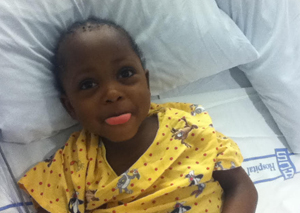
It seems impossible for Dr. Frankline Onchiri to talk about Seattle Children’s without smiling.
When Onchiri joined Seattle Children’s Research Institute as senior biostatistician and epidemiologist in 2015, his role assisting investigators at the Center for Clinical and Translational Research was so much more than a professional dream come true. It also started the next chapter of a personal journey that brought his family from Kenya to Seattle – not once, but twice – and offered him the rare opportunity to work at the hospital responsible for saving his daughter’s life.
Compassion and dedication at an early age
Onchiri grew up in rural western Kenya in a family he describes as “middle class.” While they were not wealthy, his father was an elementary and middle school teacher, enabling Onchiri and his siblings to get a high-quality education.
Onchiri excelled in school, earning his bachelor’s degree at the University of Nairobi as a double math major, specializing in statistics.
He was unsure how to turn his academic talents into a career until a professor introduced him to her work as a biostatistician, using statistics to inform the design and analysis of clinical trials for HIV/AIDS research. After graduating, he was hired as the data manager for collaborative HIV research projects between the University of Nairobi and the University of Washington (UW).
“Growing up, I saw many people in my village suffer and die from HIV,” Onchiri said. “There was such a stigma around the disease, people would not touch them. I wanted to find a way to help.”
‘It’s easier to go to heaven than the United States’

Despite his academic success and unique research experience, Onchiri did not initially imagine his career would take him to the United States. Onchiri grew up hearing about the allure of life in the United States. Many of his friends and classmates were working hard to move to the U.S., but it seemed unrealistic to Onchiri.
“We used to say in Kenya, ‘It’s easier to go to heaven than the United States,’ because a visa was more expensive than most families could afford,” Onchiri said. “I watched people flocking to the U.S. embassy on television, but only a tiny fraction got visas. The dejection in those who were denied was very discouraging.”
But Onchiri built relationships with researchers at the UW, and in 2005 he was offered a scholarship to pursue a master’s degree in biostatistics.
When Onchiri told his wife, Everline, that they would be moving to Seattle with their oldest daughter who was 1 years old at the time, she could not believe it.
Onchiri remembered, “She said to me, ‘Are you sure you’re not dreaming?’”
A life-changing illness
After completing his master’s degree, Onchiri returned to Nairobi to work as a research biostatistician and co-investigator for various research projects.
But in 2009, Onchiri’s life changed dramatically. On a Sunday night, his youngest daughter, Joey, started crying frantically. Nothing would soothe the 9-month-old little girl, so the Onchiris took her to a local hospital. For the next week and a half, doctors could not determine what was wrong, and Joey’s crying continued.
“They were frustrated with us because we kept coming back, sometimes twice in the same day,” Onchiri said. “We knew something was wrong. They just couldn’t figure it out.”
Desperate, Onchiri typed Joey’s symptoms into an internet search engine and found a potential diagnosis: sickle cell disease, a condition in which red blood cells become misshapen and can have dangerous effects, like clogging blood vessels.
At Onchiri’s request, doctors tested Joey and confirmed she had the disease. For the next nine months, Onchiri watched his daughter struggle. Having witnessed superior medical care in Seattle, he began searching for opportunities to bring his family back.
A life saved
Onchiri’s UW colleagues were eager to help him return. In 2010, he enrolled once again at the university to pursue his PhD.
Just three days after Onchiri’s family arrived in Seattle, Joey became very ill and was admitted to Seattle Children’s.

“We could tell Joey was really sick,” Onchiri said. “We were so frightened, but the doctors, nurses and social workers at Seattle Children’s were fantastic. They went out of their way to make us comfortable and let us know we were not alone in our struggle.”
For the next four years, Joey spent most of her days at Seattle Children’s, being treated for complications caused by sickle cell disease. If they had remained in Kenya, Onchiri believes she would not have survived. “I believe the doctors in Kenya did the best they could, but they didn’t have the technology or the experience to treat her properly,” Onchiri said.
During the day, Onchiri took classes while his wife was at the hospital with Joey. At night, he stayed at the hospital, studying and writing papers before rushing home the next morning to shower and eat before classes.
Despite the challenges they faced, Onchiri said his daughter’s care at Seattle Children’s was “several million times better” than it had been in Kenya.
“She has had life-threatening complications that doctors in Kenya would not have known how to treat,” Onchiri said. “I believe she would not be alive today if not for Seattle Children’s.”
In 2014, Onchiri completed his PhD.
“I did not want this struggle to define me,” Onchiri said. “I did not want to later tell my child, ‘I dropped out of graduate school because you were sick.’”
The dream job
Upon graduating, Onchiri accepted a job as a biostatistician in Kenya, but his family remained in Seattle so Joey could continue treatment.
After a year, Onchiri returned to Seattle to be with his family. He had several job offers in the U.S., but says Seattle Children’s offered him his “dream job.” Here he assists investigators in the design of research studies and applying for grants, and helps with data analysis and reporting. His empathy for Seattle Children’s patients and his dedication to pediatric research are obvious to the investigators who collaborate with him.
“Frankline brings extensive international experience to our clinical studies. He has a generous spirit and a personal stake in advancing research to improve child health,” said Dr. Michele Shaffer, a director at Seattle Children’s Core for Biomedical Statistics who works closely with Onchiri.
A promising future
Joey will turn 9 this month. Although she occasionally struggles with pain, Onchiri said she is living a normal life and has only been hospitalized once in the past three years.
“The people in this hospital — their work ethic and the compassion they have to treat kids — that’s why I wanted to work here,” Onchiri said. “Getting to work with these doctors, some who take care of my daughter, makes my job so fulfilling.”
Resources:
- About the Seattle Children’s Research Institute
- Sickle Cell Program
- Careers at Seattle Children’s

